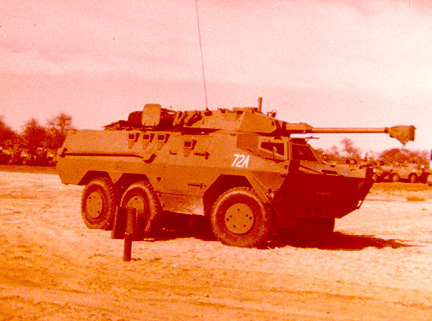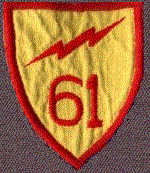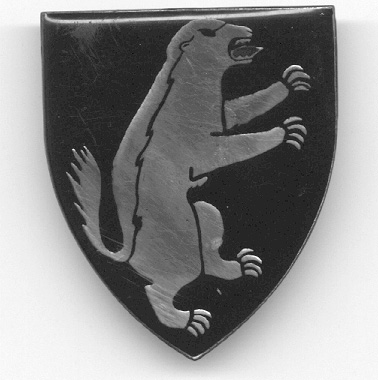

 Anthony's Military Page.
Anthony's Military Page.
Why I began documenting my SADF experience:
My 7 year old son recently became interested in guns and the military and has asked me many questions about when I was a soldier. I realised that I had forgotten so much about those intense times and began scratching around on the Internet for information on my unit etc. After reading Derek Walker's website on his SADF experiences at 1SAI, I was inspired to document my experiences, mainly as something my son may read and understand when he is older, but also inspire other draftees to do the same.
For me there was also been an unexpected benefit - I never realised how angry I was towards the old SADF until I began assembling information and dusted off the photo albums - as I recalled more and more of my experiences, the source of this anger became clearer. So this project has been extremely therapeutic in dealing with the anger that I have bottled up for 20 years.
I used the example document of the South African Veterans Association.
(external link to SA Veterans Association, select "Truth Project")
to help me organise the information gathered.

To read about my National Service experiences click on
My Military Memoirs
, or the image of the Seven-two-Alpha Ratel.
I keep remembering incidents and will continue adding them to this website.
Contributions, corrections and comments are welcome! eMail me
Military Duty in South Africa
South Africa’s conscription policy:
In 1980 the requirements for white males was 2 years consecutive duty (National Service) and then 12 "camps" to be completed over the following 12 years.
A camp consisted of a tour of duty which ranged from 21 days to 90+ days.
Theoretically, you had completed your duty when you had served 720 days of camps - unless a state of war was declared!
Failure to comply (conscientious objectors) generally resulted in 4 to 6 years of military jail (Detention Barracks), not a pleasant choice.
My response to Military Duty:
In 1976, the year I turned 16, my High School teachers handed all the male students in my class SADF registration forms and can remember wondering what the big deal was, and why my parents were so agitated about it.
In 1977, my last year of high school, I received my call-up papers - Kimberley Maintenance starting in July 1978.
Driving trucks and providing logistical support to fighting units was not considered a bad assignment, but I would have to kill 6 months doing temporary work and my parents wanted me to go to University.
So, even though I did not know what I wanted to do with my life, I enrolled at the University of Natal (Durban) school of Engineering.
I don't know why in lengthy discussions with my parents and career counsellors, the subject of leaving the country never came up on what-to-do?
Anyway I hated Engineering (it wasn't what I expected) and dropped out before the year-end examinations.
 I notified the SADF of my change of status and the dreaded papers arrived - Infantry Bloemfontein (1SAI) starting in January 1979.
This was bad, things were heating up in Angola, 1SAI featured in the news regularly (Operation Reindeer in 1978 claimed 800+ terrorists killed), and the rumours that the training at this unit was particularly brutal (the SADF "budgeted to "lose" 1% of conscripts in training/accidents.)
The good side was the fact that this unit was Mechanized Infantry and I wouldn't spend too much time walking week-long patrols and chasing terrorist spoor.
And so I reported for duty...
To read about my National Service experiences, click on
My Military Memoirs
I notified the SADF of my change of status and the dreaded papers arrived - Infantry Bloemfontein (1SAI) starting in January 1979.
This was bad, things were heating up in Angola, 1SAI featured in the news regularly (Operation Reindeer in 1978 claimed 800+ terrorists killed), and the rumours that the training at this unit was particularly brutal (the SADF "budgeted to "lose" 1% of conscripts in training/accidents.)
The good side was the fact that this unit was Mechanized Infantry and I wouldn't spend too much time walking week-long patrols and chasing terrorist spoor.
And so I reported for duty...
To read about my National Service experiences, click on
My Military Memoirs
When I had completed my 2 year stint, I was goal-less, de-motivated, and based on my experiences in Angola, the future of South Africa (and my personal future) looked bleak. Fortunately my parents encouraged me to go to university and 4 years later I received a Bachelor of Commerce degree (converts to a B. Business Administration in the USA) and began my career in the computer industry. While I was studying full-time, I was able to defer my commitments but once I started working, it was difficult to avoid "doing camps". Most campers wanted to complete their obligation as soon as possible and reported for duty when notified. As the war in Angola was escalating and there was a strong possibility that length of service could be extended yet again, this was a rational decision.
I however, decided to avoid every camp I could for as long as possible. I had 3 good reasons for this "strategy":
So, over the period from Jan 1985 when I started working to Dec 1991 when conscription ended, by claiming hardship due to job changes (I was lucky on a few occasions when my call-up orders coincided with changes of my employer), and notifying the authorities of my change of address (but omitting to register the letter with the notoriously unreliable SA Post Office), I completed 3 camps without being court-martialled (I came close, especially with the address problem.) I spent 63 days in the townships of Cape Town assisting the police with "riot-control", and two 3 week tours of refresher training at SA’s battle ground at Lohatla in the Northern Cape. (link to My Camps page coming soon.)
The apartheid system imposed abnormal stress upon it's citizens, there were all sorts of restrictions and priveliges (and exceptions) based on your race categorisation which fostered guilt and anger (depending on which side of the race fence you fell.) The country was fighting a war against Communism on it's borders and internally the ANC detonated bombs in public places and gnawed away at the confidence of the people. The soldiers and policemen had the additional strain of "doing their duty" and contributing to the economy. Over this period of my life I did not realise the distrust I harbored for the government of the day and specifically the resentment I felt towards the SADF, however, with "majority rule" somewhere in the country's future I realised that my future was not in South Africa. I found it particularly frustrating that the perverted apartheid system was morally corrupt and indefensible, was expensive to administer, divided the citizens, hobbled the economy (with the assistance of international sanctions), and made the country attractive and vulnerable to Soviet and Muslim expansionism. A 3 week vacation to Zimbabwe in April 1990 (10 years after "independance") convinced me that I was done with Africa and I began making plans to imigrate to the USA.
In June 1992, my wife and I arrived in the USA and received our American citizenship in 1999. Coming to America has lifted a great burden off my shoulders, there are stresses here, but they are manageable and the USA has a future (and therefore, so do I), but I am sad to say that I think that South Africa's future is behind it.
The future of Africa:
Summary of the future of Africa:
The future of Africa looks bleak, the West has donor-fatigue and the East is broke!
The only organisations interested in "helping" Africa are donor networks that are currently in existance and drawing salaries (ie. they continue to exist for the sake of continuity.)
The UN fatcats are drawing incredibly inflated salaries and will only make commitments to safe issues like the environment, and their status quo.
The Muslim global infiltration which has followed and supported Soviet expansion and destabilisation is the biggest threat to Africa and the world.
To read about the future of Africa and specifically South Africa, click on
The future of Africa in detail.
Source of my anger towards the SADF:
Unhealthy work rules:
I have always had a strong work ethic, basically, I will give my 40+ hours a week
and more when there is good reason.
When I am at work let's get things done and do them well, but when I am off duty,
leave me alone - that is my personal time to rest and enjoy.
That way I will also be productive (and not burned out and jaded) when I am at work.
I understood that military training needs to be hard,
but when you are off duty you should be left alone to rest and prepare for duty again.
You should not have to be on the alert for your drunk corporal coming into the barracks
looking for someone to vent his sadistic streak ranging from waterbottle PT to repeated
punches in the stomach.
This ethic also conflicts with the idea of carrying a beeper or pager 24/7,
it never allows the person to completely relax.
There is a toll in terms of mental health.
Cultural bias:
English-speaking conscripts were not treated with the same respect.
At the time there were 2 official languages and so communications were supposed
alternate between English and Afrikaans on a daily basis. This never happened!
Speaking to rank in English elicited a response ranging from "Dom engelsman"
(dumb englishman? actually I am a english-speaking South African, Sir!)
to an interpretation that you were being insolent and needed some exercise!
Miss-use of Religion:
Officially the Chaplain was ranked above the Battalion Commander, at 1SAI, the
Kommandant.
In reality the Chaplain was able to exert as much authority as a CO
(Candidate Officer) - if he was inclined to assist a troop with personal problems.
All the suicides and drug overdoses I knew of in our camp occurred pretty soon after
the Chaplain had explained that he was not able to help the troubled troop.
Surreal situation in operation Smokeshell where the day after we had captured
the enemy base, we were assembled and the Chaplain gave a service.
His basic message was to thank God for keeping us all safe (we only had 16 dead?)
and allowing us to successfully kill 300+ of the Communist, heathen enemy.
Did he not observe that most of the enemy carried at least one page of the New Testament
in their pockets?
Religious indoctrination was enforced, attending church was compulsory,
if it was at a civilian church they could not force you to enter the building,
however "services" on base you were not given that option.
You were also not allowed to use this opportunity to alleviate sleep deprivation,
and if you nodded off could expect to water poured over you,
or your chair kicked out from under you, or in repeat cases you joined a
group of fellow nodders outside for some invigorating PT!
The fact of the matter is that they were brainwashing troops into
justifying Apartheid and killing the communists, and packaging it in religion.
Lack of consideration for the families of conscripts:
Cancelling passes at the last minute was a favorite.
Eventually no-one told their parents when they were coming home and would
only attempt to contact them once you were outside the gates.
(this was the days before cell phones and 1 coin-operated pay- phone
would service 200+ troops.
I think my record was 3+ hours wait in line to tell my parents who
lived 850km away that I was coming home for a weekend!
Note: we had to hitch-hike home (often through parts of the country that were hostile to SA soldiers) when there were no buses provided. USA soldiers on official pass can fly standby on any one of the USA's commercial airlines for free! The SA Airways was owned and run by the SA govt, what was the problem?
Lack of recognition:
I earned the Pro Patria medal in June 1980, demobilised in December 1980.
There was plenty of time to hold medal parade for our company.
I was called up for a medal parade about a year after I had completed my 2 years of
National Service.
The parade was in Bloemfontein, 850km from where I lived and was mid-week, meaning I
would have to get time off work! Stick that bronze medal where the sun don't shine.
Military conscription was compulsory for white, male South Africans - considered your patriotic duty to defend your country from the scourge of communism. The alternatives were, up to six years in jail, or you went overseas and scrounged a living as an illegal while placing any career plans you had on hold until "the war was over." The sacrifice in terms of physical and mental hardships endured for 2 years and then periodically over the following 12 years was never publicly recognised or even acknowledged by the SADF or the then President P.W. Botha, who at some stage of his scurvy political career had been Minister of Defence!
I think the USA's Vietnam veterans experienced the same frustration or "non-appreciation" of the sacrifices they made, when they came home. However, America has learned from their mistakes and USA soldiers (and law enforcement officers) are treated with respect and appreciation by their fellow citizens,